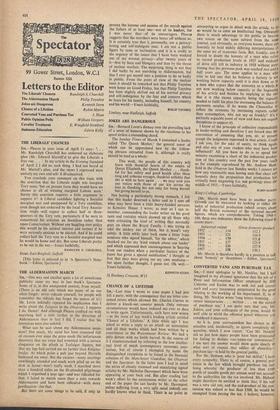CHANCE OF A LIFETIME
SIR,—Last time I wrote to your paper I had just left a party, with the consequence that my letter con- tained errors which allowed Mr. Charles Curran to deliver a- knock-out counter punch. Only extreme circumstances would have induced me ever to dare to write again. Unfortunately, such have now arisen —in the form of last week's leading article entitled 'Chance of a Lifetime.' A little while ago I was asked to write a reply to an attack on economists and all their works which had been written by a contributor to the Westminster Review. We had a jolly debate with no holds barred. In the course of it I counterattacked by referring to the low intellec- tual level of much contemporary economic jour- nalism, but of course I exempted by name the distinguished exceptions to be found in the financial columns of the Manchester Guardian, the Observer and the Spectator. In the latter case I had in mind the series of closely reasoned and stimulating signed articles by Mr. Nicholas Davenport which have been appearing at your back end. But after reading last week's effort by the anonymous writer at the other end of the paper (he can hardly be Mr. Davenport unless suffering from a very split mind indeed) one hardly knows what to think. There is no point in attempting to argue in detail with the article, to do so would be to enter an intellectual bog. Obviously there is much advantage to the public in hearing two voices on the same subject from the sane journal, and obviously, as everyone knows, there can honestly be held widely differing interpretations of the same set of economic facts. But, frankly, one is forced to doubt the honesty of a man who refers to record production levels in 1957 and evidence of drive still left in industry in 1958 without men' tioning that the previous peak was reached two and half years ago. The same applies to a man who tries to kid one that he believes a factory is not working below capacity until it is shut down or to a man who argues that the economy as a whole it not now working below capacity at the beginning of his article and finishes by implying at the end that it is (the excess capacity being the capacity needed to fulfil his plan for increasing the balance of payments surplus. If he wants the Chancellor to reflate the economy by increasing exports rathel than consumption, why not say so frankly? It's e perfectly arguable point of view and does not require deceptions to support it). I know of the principle of collective responsibility in leader-writing and therefore I am forced into the convention of assuming that you, sir, at present accept the judgments expressed in that article. Could I ask you, for the sake of sanity, to think again, and also any of your readers who may have been influenced? All you have to do is to spend five minutes examining a chart of the industrial produc' tion of this country over the past few years (such as for example reproduced by Mr. Andrew Show field in the Observer last Sunday week). I cannot go how any reasonable man having seen that chart can honestly deny the proposition that production has virtually been stagnating (i.e. not growing) since the middle of 1955.—Yours faithfully,
King's College, Cambridge [Mr. Marris must have been to another party Growth can be measured by looking at either the index of industrial production (which covers about half the British economy) or the national income figures, which are comprehensive. Taking 1948= 100, these two indicators show the following trend in recent years : Industrial output Gross domestic product 1952 .. .. 114 112.3 1953 .. .. 121 116.9 1954 .. .. 130 121.8 1955 .. .. 137 125.9
1956 .. 136 127.9
1957 .. .. 138 130.1
Mr. Marris is therefore hardly in a position to talk about 'honesty' or `deceptions.'—Editor, Spectator.]




























 Previous page
Previous page